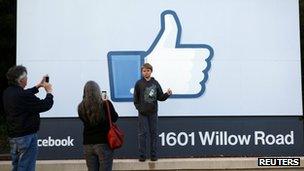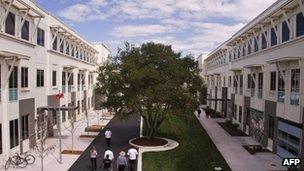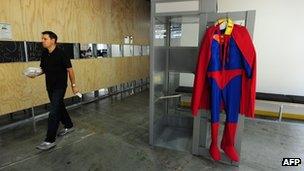California expects Facebook boost
- Published

Being home to Facebook's headquarters has given Menlo Park a "buzz", says the city's mayor
Facebook's share sale is going to create hundreds of multi-millionaires, a handful of billionaires and make the founder Mark Zuckerberg one of the richest men on the planet.
When trading starts in New York, the shares will be available to the public at $38 (£24) apiece and are expected to generate $16-18bn (£10.1-11.4bn) - the third biggest public sale in US history.
Not bad for a nice little idea dreamed up in a Harvard dorm eight years ago which now has 900m followers around the world and is valued at well over $100bn (£63bn).
Those selling are not the only ones salivating at the prospect of all that money.
California is banking on Facebook to help shrink a gigantic budget deficit.
"Our estimates are that California is in line to collect around $2bn (£1.26bn) of extra taxes in the next year solely as a result of the Facebook transaction," says Jason Sisney at the state's Legislative Analyst's Office.
"That doesn't come close to addressing California's budget problem, but it's a help and Facebook and the tech sector generally are a real bright spot for the state's economy right now."
Cash injection
California's governor Jerry Brown announced earlier this week a budget deficit of almost $16bn for the year ahead.
The state is cutting already battered social services and education spending and even with the Facebook injection is still hoping voters will support a plan to increase taxes on the wealthy.
Around $6bn (£3.8bn) is due to be generated just for the company and Mark Zuckerberg will keep a majority control over the big decisions, holding more than 50% of the voting rights.
He wants to make Facebook even bigger by tapping into the Chinese market and finding ways of making advertising more profitable.
The advertisers love the number of people they have access to - and the reams of personal information people share, allowing them to target ads specifically.

Facebook is planning to expand its headquarters in Menlo Park
Whether advertising on Facebook equals sales is still untested, but the potential for success is what has driven the value of the company up.
Facebook's headquarters in Silicon Valley is the former home of Sun Microsystems, in a place called Menlo Park which is already loving the new addition.
"It brings a lot of great benefits to Menlo Park," said the city's mayor Kirsten Keith.
Facebook doesn't generate any income in sales tax, so the city council has done a deal which sees the company pay $800,000 (£507,000) a year for the next five years in lieu of sales tax, and even more in the years ahead.
"There's a $1.1m (£697,000) one-time fee for capital improvement projects, and so many other benefits including $500,000 (£317,000) community grants and they have reached out to schools, providing computers and volunteer work," Ms Keith says.
There are more jobs and an expansion of the headquarters planned.
"It's about having an amazing company in your community that attracts more amazing companies because people want to be near Facebook - this place has the buzz and the vibe," Ms Keith adds.
New millionaires
It is a buzz which has a knock-on effect on the housing market - property in Silicon Valley is among the most expensive in California.
"The last I checked the data it looks like the average appreciation rate is somewhere around 20% over a year ago, which is pretty significant," said Robert Gerlach from Alain Pinel Realtors in Palo Alto.
He deals with properties from $500,000 up to many millions and says money - even in cash - does not go very far in Silicon Valley.
"We have had IPOs before so this is not a new phenomenon for us - when Google went public for example we had a lot of people out there looking to buy homes.

Some Californians hope that Facebook's success can help rescue the state's economy
"For Facebook it's been going on for some time as many of the employees were able to borrow against their stocks early.
"So we are not waiting for the company to go public for people running around with money - some of those people have already bought homes."
Mr Gerlach says a lot of the housing price increases was also to do with foreign investors and foreign money coming in from Russia or Asia.
The extra money swishing around is also good news for financial advisers.
"Most of the people that would be working at Facebook do not have a strong financial background so they definitely need guidance," said wealth manager John Hillis in San Jose.
His advice for the nouveau riche is: let the dust settle for six months to clear your head and decide what to do with your cash.
"Then start a systematic programme of diversifying out of Facebook or whatever company you are in to get a portfolio that's going to reduce the risk of any disasters and provide for you long term," he said.
Good advice if you suddenly wake up one day and find you are a multi-millionaire.
- Published18 May 2012
- Published18 May 2012
- Published17 May 2012
- Published17 May 2012
- Published18 May 2012